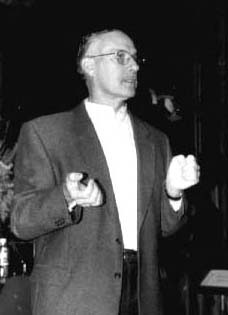TC Celebrates Founders Day
For the second year in a row, Teachers College set aside a Saturday in November to celebrate Founders Day, an academic homecoming at which alumni, students, and staff members gathered at the College to hear renowned speakers and get a sense of what is happening at Teachers College today. It also gave some of them a chance to reconnect with people from the past.
President Arthur Levine opened the day's festivities by welcoming those who had come to hear the keynote speaker that morning. New York City Public Schools Chancellor Harold Levy, the scheduled speaker, was unable to attend. Levine said in an effort to come as close as possible to Harold Levy in finding a replacement, he was able to find someone with the same initials-Henry Levin, the William Heard Kilpatrick Professor of Economics and Education and the Director of the National Center for the Study of Privatization in Education (NCSPE).
Levin's remarks focused on voucher plans, such as "Why now? Why is it happening? What has happened historically?"
He spoke about the mention of voucher plans in education as far back as the American Revolutionary War. The highlight of his presentation, however, was the explanation of the voucher plan designed by market economist Milton Friedman, a professor in the Department of Economics at the University of Chicago in the 1950s. Friedman's plan called for providing families with a "modest" voucher to be used toward each child's education. His plan did not generate interest at the time, since the push was to build more schools to accommodate the growing population of school-age children. It was only in the late 20th Century when the public education system was being challenged that vouchers were looked at more closely.
Levin demonstrated ways to determine what advantages and disadvantages the various plans offer. The advantages of one plan may meet the needs of some people, while the advantages of another would find favor with a different group. The problem that public education was designed to solve was balancing a society's right to reproduce itself with an individual family's right to make decisions that are within their own personal values. NCSPE provides an objective study of the various plans for school choice and the needs they each meet.
Breakout sessions followed the keynote address. One featured musical entertainment by SPIRIT, an ensemble directed by TC adjunct professor Bert Konowitz.
A session presented by Kathleen O'Connell, the Isabel Maitland Stewart Professor of Nursing Education, looked at Perils and Possibilities of Playfulness. She discussed her research on the tendency for people to reverse from calm, goal-oriented (telic) to highly aroused, spontaneous (paratelic) behavior throughout their lives, particularly in relation to quitting smoking. Other behaviors, such as drinking, sexual behavior, gambling, exercise and stress, are also linked to these states. When people do not change from one state to the other, and become stuck, there can be mental health problems. Associate Professor of Education and Law Jay Heubert discussed the very timely topic of High Stakes Testing: Opportunities and Risks. Heubert recently directed a Congressionally mandated study conducted by a committee of the National Academy of Sciences (NAS), on the use of tests for student tracking, promotion, and graduation. For more details on that study, go to www.tc.columbia.edu/~newsbureau/tcreports.
Alumnus Michael Passow (Ed.D. 1974), whose father, the late A. Harry Passow, was the Jacob H. Schiff Professor Emeritus at Teachers College and was a member of the TC faculty for nearly 40 years, presented a talk on The Changing Science Classroom.
Passow applauds the use of technology in the classroom and uses it to give his students the best possible scope of Earth Science. He takes his students deep into the ocean and high above the clouds via computer simulation CD-ROM disks in his eighth grade classroom in White Plains. He can predict weather with his students with almost real-time radar. "Teachers need to transmit skills and visions to students and allow the students to become interactive participants rather than passive viewers," he explained.
A session on The Global Marketplace: The Place for Educators was presented by alumna Maryalice Mazzara, (Ed.D. 1984) who is Director of Teacher Training Outreach at the School of International and Public Affairs at Columbia University, President of The Geneva Global Group, Ltd., and adjunct professor in the Department of International and Transcultural Studies at TC. Mazzara led a discussion on the various ways that the marketplace and the world are becoming increasingly global. She discussed theories by Robert Kohl and invited participants to talk about their experiences and questions in dealing with international issues in the workplace, as students, and as educators.
At the end of the day, the international alumni and faculty emeriti and former and current members of the alumni council held receptions across the campus. Stamos Zades, who received his master's degree in Student Personnel Administration in 1950 talked of his interest in international education and how Teachers College was a "turning point" in his career after World War II. Zades is professor emeritus at The City University of New York. He called TC "the Mecca of education," appreciating what it had done to enrich his life.
André McKenzie, who is a member of the Alumni Council and Vice President for Academic Support Services at St. John's University, raved about Founders Day. McKenzie, who received his doctorate from TC in 1986 in Higher and Adult Education commented that the "day brought out the TC spirit. "There was a sense of camaraderie and real exchange of ideas."
Published Tuesday, Sep. 18, 2001
